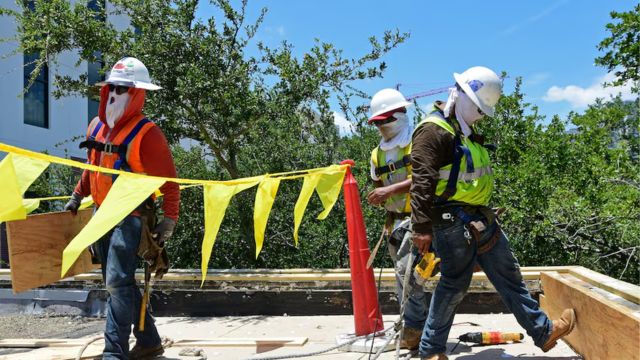In a move that has stirred significant controversy, Florida Governor Ron DeSantis signed a bill on Thursday that prohibits local governments from enacting heat protection measures for outdoor workers. This legislative action effectively bars initiatives like those previously considered in Miami-Dade County, which aimed to mandate water access and shade breaks for workers on extremely hot days.
The bill, which was quietly signed into law alongside nine other bills without a press conference, was passed by the Florida Senate in March 2024. It specifies that local governments cannot impose requirements on companies to offer protections against heat exposure beyond what is currently mandated by existing laws.
This decision comes despite there being no comprehensive federal or state regulations specifically safeguarding outdoor workers from the dangers of heat.
The signing took place under the radar, deviating from Governor DeSantis’ usual practice of public bill signings, and was only announced in a Thursday night press release. This subtlety has not mitigated the backlash from various community and labor groups that have long advocated for more stringent protections for workers in heat-intensive environments like construction and agriculture.
Senator Jay Trumbell (R-Panama City), the sponsor of the bill, defended the legislation, stating, “The intent of the bill is to ensure that employers have the ability to govern themselves and create the best working environment for their employees.” However, this perspective is not universally accepted. Critics argue that local conditions, especially in a state known for its severe heat and humidity, necessitate tailored local solutions, not a blanket prohibition on additional protections.
Senator Victor Torres (D-Kissimmee) voiced a strong dissent, highlighting the practical challenges of enforcing worker safety without local ordinances. “Let’s face reality. We have bad actors out there. OSHA can only do so much. Is OSHA everywhere in the state, to where you can say a phone call will have somebody respond to that location? No. They don’t have enough manpower,” he explained.
This legislation comes on the heels of record-breaking heat in 2023, recognized as the hottest year in recorded history, which saw southern parts of the United States, including Florida, grappling with prolonged periods of oppressive humidity and triple-digit temperatures.
The new law has sparked a heated debate about the balance between state control and local autonomy, the role of government in worker safety, and the potential risks faced by outdoor workers in Florida’s challenging climate. As the state prepares to navigate the implications of this decision, the conversation around workers’ rights and environmental adaptability continues to evolve.

